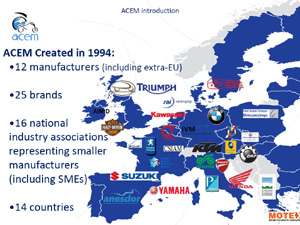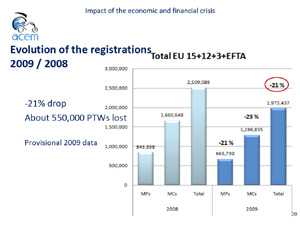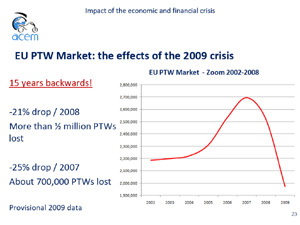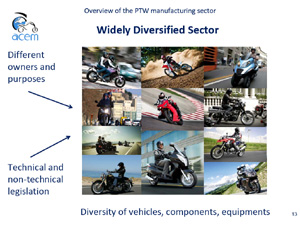European Motorcycle Makers Want Regulatory Stability and Fair Competition
2010/04/09 | By Quincy LiangEurope, one of the world's most important markets for high-end powered two-wheeler (PTW), products was severely affected by the financial and economic crisis, which struck a blow at public finances, businesses, employment, and household income. Of course, the crisis took a heavy toll on the European motorcycle industry as well.

During the ACEM (Association of Motorcycle Manufacturers in Europe) annual conference on Jan. 28, representatives of the industry as well as managers and officials from European Union institutions in Brussels called for a common strategy to overcome the crisis and move toward recovery.
The dismal background to the conference was this: registrations of PTWs began plunging in the final quarter of 2008, and plummeted 21% in 2009.
ACEM is the professional body that represents the interests and combined skills of 12 PTWs manufacturers producing a total of 26 motorcycle and moped brands, along with 15 national associations from 13 European countries, which together have a turnover of 34 billion euros and provide jobs to over 150,000 people. ACEM members are responsible for 90% of production and up to 80% of sales in the European PTW market.
The fall in demand naturally brought on a decline in production, putting high pressure on manufacturers and employment. ACEM noted that in response to the climate of uncertainty, exacerbated by the import of low-cost products from Asian countries, the European Commission (EC) is preparing to submit a proposal for a new technical regulation for the type-approval of PTWs.
Just over a year ago, ACEM announced a series of initiatives focusing on environment and road safety. ACEM members are determined to keep to these commitments, especially in view of the EC's upcoming EU 2020 strategy for boosting the economy and employment.
To achieve these objectives, ACEM said, European motorcycle manufacturers are urging policymakers to outline a dedicated strategy for the short and medium terms, underlining the importance of strengthening Europe as a destination for investment. In this regard, Gabriele Del Torchio, CEO of Ducati, one of the world's leading performance-bike makers, stresses the need for supportive measures for the PTW industry and calls for swift action to ensure that the European industry will be in the right position when recovery comes.

The EC Proposal
During the ACEM Conference, Giacomo Mattino, deputy head of the automotive industry unit at the European Commission DG Enterprise and Industry, announced that the EC's proposal, due in April, would have environmental and road safety objectives, while taking into account the lead time needed to adjust production.
Bern Lange, a member of the European Parliament and chair of the conference, underlined the need for ambitious targets while acknowledging that the industry needs a clear roadmap with sufficient lead time if the goals are to be achieved.
To restore confidence, ACEM noted, it is necessary to address several issues, including a new European regulatory framework for PTWs that is justified by a long-term perspective and based on cost-benefit analysis. This approach, the Association believes, will ensure regulatory stability and simplification, providing the industry with a sensible timeframe and sufficient flexibility to develop new products that meet costumer demand.
Innovative technologies, especially with regard to urban mobility, are already on the market, with more efficient vehicles, hybrids, three-wheelers, and advanced braking systems becoming increasingly available. If electric motorcycles are soon to be a reality in the market, fiscal incentives and the installation of recharging stations will be crucial to stimulate demand. Much depends on the infrastructure and policy-makers still have an important role to play, the Association added.
The ACEM conference provided an opportunity to address the issue of imported products from emerging markets like China, and of the serious concerns they are causing because of safety and environmental flaws. In fact, these vehicles often do not meet type-approval requirements. To protect exports, ACEM stressed, greater attention must be paid to ensure equal conditions in foreign markets.
"We are pleased with the close collaboration established with the European Commission in the context of the future PTW regulation,” commented Jacques Compagne, ACEM's secretary general. “The Commission has acknowledged the serious crisis faced by the industry, as well as the opportunities it represents for the European economy. The PTW industry is ready to play its part provided the objectives are achievable and a reasonable lead time [is provided]. Furthermore, if we want a thriving PTW industry in Europe, a level playing field has to be guaranteed, here and abroad, for all manufacturers, including those from emerging economies".
In his presentation on the topic of "Which industrial policy for the motorcycle sector?", Compagne raised several proposals for the European PTW industry.
Addressing the economic and financial crisis, the secretary general urged related authorities to map out measures to support sales. Based on the high number of companies and employees involved in the sector, he said, EU member states should maintain or establish wise scrapping schemes, which would bring obvious benefits to the environment. He also called for financial support measures, asking member states to motivate their respective financial sectors to restore access to credit and reasonable credit terms for consumers and businesses, which need to restore cash flow and inventories.
Addressing external trade conditions, the secretary general called for fair competition and access to extra-EU markets.
Compagne urged the restoration of a fair playing field for EU and extra-EU competitors through intensive focused activities from market surveillance authorities to the benefit of consumers, road safety, environment, and the PTW industry. He also called for balanced trade agreements with third countries through the reciprocal removal of tariff barriers as well as technical and non-technical barriers.
In regard to the fragmentation of the market, Compagne proposed various moves at different levels. At the international level, he said, the EU Commission with the support of the member states should continuously promote the worldwide harmonization of technical regulations through the United Nations Economic Commission for Europe (UNECE), and demand the enforcement of those regulations by the contracting parties. At the EU level, the EU Commission should ensure consistent application of legislation by the member states (e.g. implementation of the 3rd EU Driving License Directive, or 3DLD, etc); while at the national level, the secretary general said, member states should keep the aim of a more harmonized internal market in mind when devising new measures.
For future PTW technical regulation, Compagne said, "The industry, fully assuming its social responsibility, pro-actively proposed a series of technical measures to address the PTW road safety and environmental challenges, through constructive cooperation with EU institutions. These measures include voluntary commitment on Advanced Braking System deployment (on 75% of road motorcycles by 2015) and a two-stage reduction of polluting emissions for vehicles (leading to a 50% reduction for motorcycles).”

Addressing the future PTW technical framework from the viewpoint of the EU Commission, Compagne said that the EC should carefully consider the intrinsic characteristics of the sector and its possibilities in the current difficult context and set goals of future regulation accordingly, such as appropriate lead time and a pragmatic approach.
"The EC should develop a similar approach to CARS 21 (Competitive Automotive
Regulatory System for the 21st century) for the PTW industry, Compagne concluded. “A predictable regulatory framework could represent significant support and improve competitiveness.”





